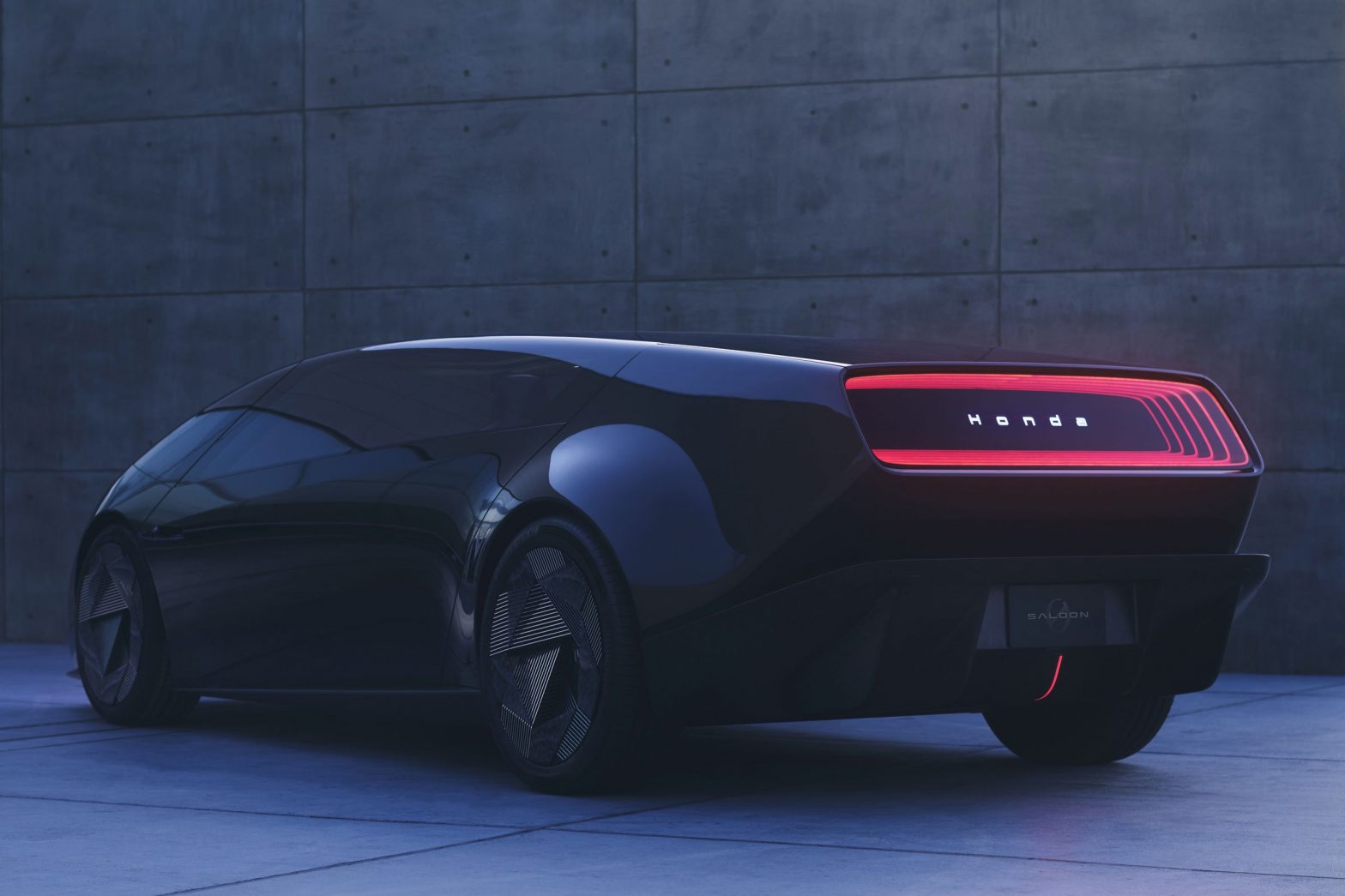/
Honda Zero includes two concepts: the sleek, sedan-like Saloon, and a boxier big-booty van-thing called the Space-Hub.
Share this story
If you buy something from a Verge link, Vox Media may earn a commission. See our ethics statement.
:format(webp)/cdn.vox-cdn.com/uploads/chorus_asset/file/25212017/c_ASALOON.png)
The Saloon concept will be the basis for the first Honda Zero production model coming in 2026.
Image: Honda
Honda announced a new global electric vehicle series, dubbed Honda Zero, presenting it as an antidote to the recent trend of “thick, heavy” EVs seen on the road today. Honda says it will introduce its first model, based on a sleek, sedan-like concept called the Saloon, starting in North America in 2026.
In addition to the Saloon, Honda also introduced a boxier van-esque concept called the Space-Hub. The concepts are meant to demonstrate Honda’s lighter approach to EV development, riding atop a “thin” vehicle architecture with a low floor that’s meant to accentuate aerodynamics.
:format(webp)/cdn.vox-cdn.com/uploads/chorus_asset/file/25212379/c_HNew_H_Mark__1_.jpg)
Yep, still an H.
“Thin” and “light” are two of the three principles, the third being “wise,” that Honda says is guiding the development of the Honda Zero EV series. The automaker stressed a start-from-scratch engineering approach to the lineup, including a new H-mark logo that it says will be featured exclusively on its next-generation EVs.
How exactly Honda plans to achieve this new weightlessness in its next-gen EVs is still unknown. Many of the EVs hitting the US market this year are big, heavy SUVs and trucks, complementing a broader trend in car buying that has seen some companies stop making sedans altogether. But Honda seems to be suggesting there’s another way, especially around smaller, slimmer, and more lightweight vehicles.
Honda, of course, is also partnered with Sony on the design and development of the latter’s Afeela electric car, which was first introduced at CES last year. The Afeela is also coming to the North American market by 2026, though there’s no word on how it connects — if at all — to the Honda Zero lineup.
:format(webp)/cdn.vox-cdn.com/uploads/chorus_asset/file/25212374/c__SALOON.jpg)
The low, sloping shape gives it a sporty feel that cribs from Honda’s Formula 1 experience.
The Saloon has a sloping fastback shape with unique rectangular lights in the front and rear that resemble a vintage Black & Decker Dustbuster. The vehicle seems like it rides extremely low to the ground for an overall sporty performance derived from Formula 1 racing. The interior is minimal, with Tron-like lighting accents, a single central display, and wheels with pixelated covers that peer through the darkness.
The Space-Hub resembles a minivan with minimal overhangs and a rear light that has a similar look to Rivian’s electric delivery vans for Amazon. The Space-Hub will also include a huge panoramic moonroof that curves over on the side to create an almost greenhouse-like effect. Inside are two bench seats facing each other, suggesting that an autonomous shuttle service could be a possible future use case. There is no rear window, meaning drivers will likely need to rely on cameras to see out the back.
:format(webp)/cdn.vox-cdn.com/uploads/chorus_asset/file/25212375/c_DSPACE_HUB.jpg)
The Space-Hub is neither a hub nor eligible to go to space.
No real specs are being released, but Honda says these future EVs will be both partially and fully autonomous, depending on the configuration. A marketing video featured a retractable steering wheel that emerges from the dash when needed, suggesting that customers will be able to toggle between human and robot driving as the mood fits.
The advanced driver-assist features will be based on Honda’s Sensing platform, which debuted with the Honda Legend in Japan in 2021. Honda Sensing is a Level 2 system, meaning drivers still need to pay attention to the road and are legally liable for the car’s operation. Hands-free driving on “expressways and surface streets” will be available starting in the mid-2020s, including in more affordable models, the company says.
:format(webp)/cdn.vox-cdn.com/uploads/chorus_asset/file/25212376/c_BSALOON.jpg)
It’s coming to suck up your dust!
The Honda Zero series will be sporty, borrowing performance-enabling designs from the automaker’s Formula 1 racing experience. Honda is also aiming for optimum battery efficiency through its use of e-Axles, a system consisting of a motor, inverter, and gearbox that converts electric power into energy for driving.
Like several other automakers, Honda is planning on introducing more AI-powered features in its future lineup of vehicles. These features will collect data about driver preferences to present a more personalized experience as well as make route suggestions based on location information.
:format(webp)/cdn.vox-cdn.com/uploads/chorus_asset/file/25212382/c_ESPACE_HUB.jpg)
The Space-Hub’s interior is very greenhouse-ish.
:format(webp)/cdn.vox-cdn.com/uploads/chorus_asset/file/25212381/c_CSALOON.jpg)
A retractable steering wheel allows drivers to toggle between manual and automated driving.
So far, Honda’s global EV offerings have been sparse. There’s the Honda e city car, only available in Europe and Asia and set to be discontinued this year, and the Prologue SUV, which is coming soon to North America. There’s also the upcoming Acura ZDX from the company’s performance brand. Overall, Honda is aiming for 30 new EVs by 2030 with 2 million units sold, 100 percent zero-emission auto sales by 2040, and carbon neutrality “for all products and corporate activities” by 2050.
But there have also been setbacks. Honda recently canceled its plans to build a lineup of affordable EVs with General Motors. And Cruise, GM’s autonomous unit in which Honda is also an investor, has paused all public operations after a pedestrian was injured by one of the company’s driverless vehicles.
The Prologue SUV is set to reach customers this year, Honda’s first major effort to sell electric vehicles in North America since the oft-maligned Clarity. But while that car would look right at home nestled in with the CRV and Pilot, these new vehicles are designed for double takes.
